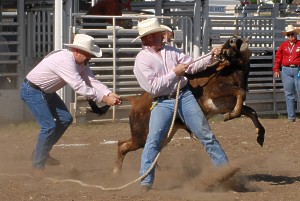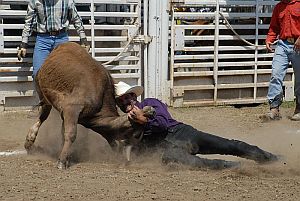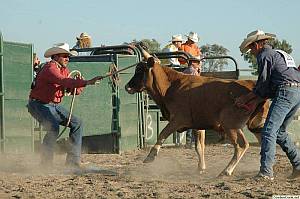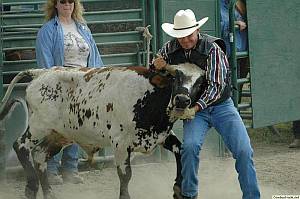IGRA STATEMENT ON ANIMAL WELFARE
The International Gay Rodeo Association (IGRA) hereby endorses and adopts the promotion of animal welfare and the humane, responsible treatment of animals in their housing, feeding, training, exercising, and competition.We strive to assure that our events are purposefully tailored and executed to provide animal and human participants the safest environment possible and shall act to immediately disqualify or reprimand any contestant, official, or contracted personnel found to be treating animals in an inhumane manner.
Animal Issues For Rodeo Directors
There have been many concerns expressed by animal activists groups about the sport of rodeo. It is not uncommon for PETA (Prevention and Ethical Treatment of Animals) members to stage demonstrations at some of the larger professional rodeos. Some PETA members have occasionally been active at IGRA rodeos. They sometimes distribute erroneous information or misleading statements which may include accusations of the use of flank straps, electric prods, and spurs.The International Gay Rodeo Association has over 75 rules and references in the rodeo rule book pertaining to the treatment and welfare of the animals used on the IGRA circuit. All IGRA member associations are required to adhere to these rules. IGRA reviews and updates these rules and regulations at our annual conventions. In addition, there is a rodeo review meeting after every IGRA sectioned rodeo. These meetings are monitored closely by the Animal Concerns committee to assure our rules and regulations are enforced.
It is important that any rodeo personnel who have been designated as press or protest group spokespersons understand the message IGRA wants to convey. In the event that your rodeo has animal protesters, it is vital that no one other than designated personal be involved in contact with such groups. It is very important for your spokesperson to know and follow these recommendations:
- Know the IGRA Animal Welfare Statement.
- Be knowledgeable about the restricted use of spurs, electric prods, and flank straps.
- Do not argue with the protestors or press.
- Know the IGRA rule requirements for each event (weight, size requirements, etc).
- You are not required to answer every question asked; antagonistic questions intended to create friction are better left unanswered.
- Your veterinarian is an excellent resource who can help answer questions about animal cruelty.
- Know the differences between the calf-roping events in pro rodeo and IGRA rodeos.
Additional precautionary security steps to conceder when Animal Rights Activists may be present:
- Make sure that everyone coming on to the grounds after hours has proper credentials.
- Increase your rodeo security, especially in the barn and livestock holding pens. Some protestors have been known to open gates releasing animals.
- Make sure security continually checks the perimeter of the grounds. In the past some contestant's cars and trailers have been spray painted.
In any sporting event there is always the possibility of injury. IGRA certified officials make every attempt to avoid any injury-producing situation. We are very proud of our animal injury record, which is less than one half of one percent. We have had Humane Society inspectors on site at several of our rodeos and have never received a citation or fine from them.
How does IGRA ensure healthy animals?
- Only healthy animals are allowed to perform in the arena.
- IGRA requires that all livestock have appropriate health certificates and that these animals be inspected several times by certified officials prior to their performance.
- There are provisions for removing any animal from competition if for any reason the animal does not meet IGRA guidelines.
- We require that a large animal veterinarian be on site during all performances. If a rodeo does not have a veterinarian on premise during the rodeo a substantial fine will be assessed.
It is important to remember that our stock contractors have a huge monetary investment in their stock; they want to be sure their animals are not abused during competition and are well cared for after their performances.
Animal Issues Checklist:
- Meet with your veterinarian prior to the rodeo and educate him or her on our rodeos and rules.
- Schedule a backup veterinarian in case your primary veterinarian can not attend the rodeo. This could eliminate a $1500.00 fine if your veterinarian can not attend.
- Have copies of the IGRA Animal Issues and Safety statement to hand out, or use copies of your program with the statement in it.
- Monitor photos that will be used in advertising, programs and on your website.
- Avoid using pictures that may appear to the uninformed as stressful on the animals. Examples of good and poor choices of images to use on your website or in publications are included below.
- Include the IGRA Statement on Animal Welfare in your program. Only use the statement in the rodeo rule book; do not add your own commentary.
- Designate a media spokesperson. Make sure that he or she is able to convey the correct and accurate message about our rodeos.
- Have a plan in case protesters show up. Your rodeo staff and security must know what your plan is.
- Communicate with the rodeo groundskeeper about your rodeo needs. Some rodeo grounds are only finished to 2 or 3 inches in depth. It is highly preferred the finish be 5 to 6 inches in depth. Also make plans for equipment to workup the grounds during the rodeo and have access to a water truck.
- Walk through the chutes and holding pens and barn stalls two days prior to the rodeo to make sure there are no hazards in these areas. If there are, contact the rodeo grounds to get them fixed.
- Make sure there are filled water tanks in the holding pens when the rodeo stock arrives.
- If you are responsible for the contractors hay make sure you obtain quality hay. Don't provide feed that you would not give your own animals. Remember, these animals are an important part of your show; the better they are fed, the better they will perform.
- Have a plan in case an animal is injured. Designate an area to put injured animals (such as a stall) away from the general public. Have a phone number available for an animal disposal service in the event this becomes neccessary.
- Some stock contractors ask rodeos to put up banners on the return gates. This is sometimes done to assist the animals in seeing that the gate is closed. Animals may be run through the Arena a few times before the rodeo to train them where the return gate is. Without a banner, the animals might run into the closed gate. Check with your stock contractor before the rodeo to see if he would like banners on the return gates.
The best recommendation for animal issues and safety is to be prepared and to have a working knowledge of IGRA's views and policies on this subject. Remember, we can't have a rodeo without livestock. Animal rights groups continue to push for legislation to restrict the use of animals in rodeos. Many states are adopting rules to oversee rodeos and in some cases, counties have banned some rodeo events. Let's ensure that we don't give ammunition to these groups to use against our rodeos.
Example Photos
| Click for larger versions | ||
| Examples of images that would be poor choices: | ||
| Animal looks like it is under stress. | Neck appears excessively twisted. | |
 |  | |
| Examples of images that would be better choices: | ||
| Animal doesn't look stressed. | Animal appears unfazed by contestant. | |
 |  | |